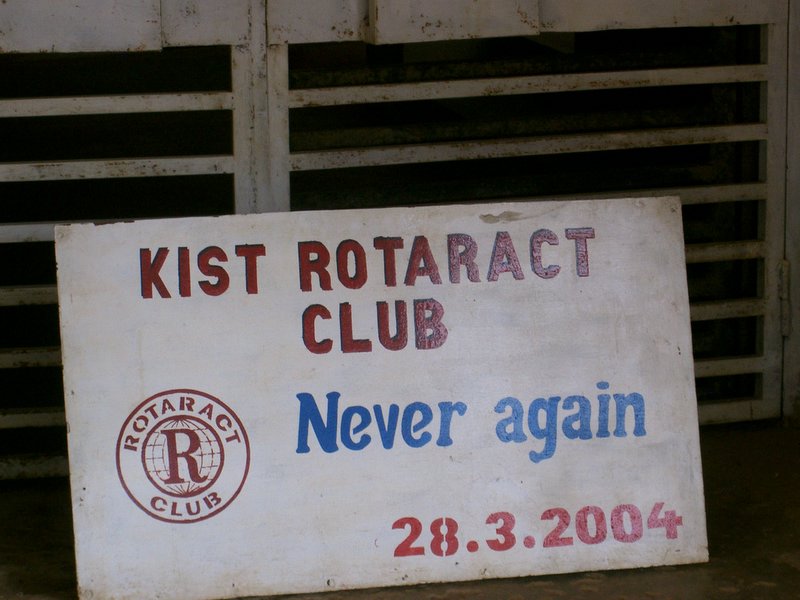You CAN Go Home Again, Part 2
In the spring of 2000, I agreed to become the president and chief executive officer of Survivors of the Shoah Visual History Foundation, the predecessor of USC Shoah Foundation - The Institute for Visual History and Education. My family and I were then living in Chicago, but the hectic pace of preparing to move to Los Angeles did not prevent my wife, Margee, and me from stealing away for a weekend to celebrate our 30th anniversary. We found an isolated beach and flew off, knowing that we would return to the inevitable chaos of moving to LA.
 A sign commemorating the 10th Anniversary of the Rwanda Genocide, in a small town outside of Kigali.
A sign commemorating the 10th Anniversary of the Rwanda Genocide, in a small town outside of Kigali. Margee was right, of course, that there was plenty to do without adding a new collection from another genocide to an already daunting agenda. We moved to LA, and I was soon distracted by the myriad tasks of being the new CEO of an organization that held the largest collection of video testimonies of the Holocaust in the world. But the Gourevitch book had moved me deeply, and the “Rwanda idea” was always there nudging me. I had the opportunity to discuss the idea with the Institute’s founder, Steven Spielberg, many times. He always encouraged me to pursue it, as long as I kept the Shoah Foundation on its original path as well.
In 2004, a set of serendipitous circumstances made it possible me to travel to Rwanda for ten days with a colleague from the Clinton Foundation. I met with survivor groups, government officials, university officers, and NGOs of all kinds. My idea – launched back on that beach in 2000 – seemed to have some appeal to them, and a visit to the Kigali Memorial Centre, operated by Aegis Trust (of which the current executive director, Stephen Smith had been one of the main designers) confirmed my conviction that our work on the Holocaust could complement work of a similar kind on the Rwandan genocide.Suddenly, the original idea had some traction: I made another trip, we raised some funding to bring a Rwandan delegation to Los Angeles, we moved the Institute to USC (which already had faculty members doing research in Rwanda), and we signed an agreement with IBUKA, the leading survivor organization in Rwanda, for a collaborative project to collect testimonies of survivors of the genocide.
As I write, Stephen and the other members of the senior management team are departing for Kigali with a mission of Institute supporters and friends in order to participate in the commemoration of the 20th anniversary of the Rwanda Genocide, which begins next week. It’s wonderfully serendipitous for me to have the opportunity to bid them farewell and also to remember that long ago weekend at the beach when Philip Gourevitch changed my life.
Like this article? Get our e-newsletter.
Be the first to learn about new articles and personal stories like the one you've just read.